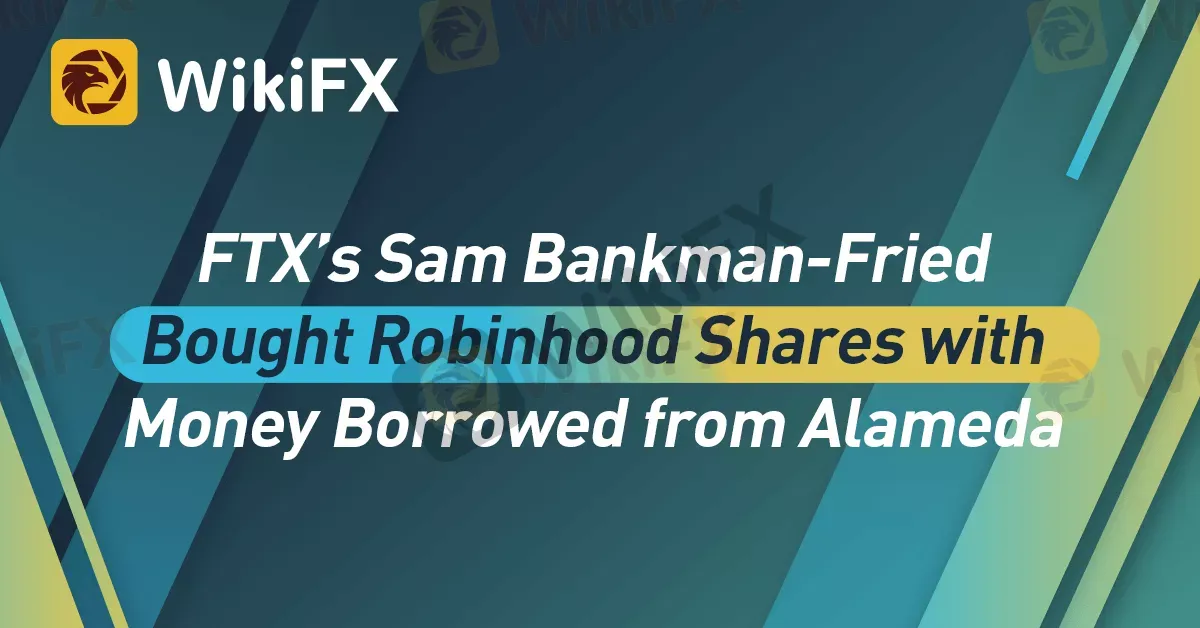简体中文
繁體中文
English
Pусский
日本語
ภาษาไทย
Tiếng Việt
Bahasa Indonesia
Español
हिन्दी
Filippiiniläinen
Français
Deutsch
Português
Türkçe
한국어
العربية
FTX’s Sam Bankman-Fried Bought Robinhood Shares with Money Borrowed from Alameda
Abstract:SBF claimed that he borrowed $546 million of funds from FTX’s affiliate trading firm, Alameda Research, to purchase shares in Robinhood Markets,Inc.

According to American media, SBF claimed that he borrowed $546 million of funds from FTXs affiliate trading firm, Alameda Research, to purchase shares in Robinhood Markets, Inc. In an affidavit provided to a Caribbean court before his arrest, Mr. Bankman-Fried said he and FTX co-founder Gary Wang together borrowed more than $546 million via four promissory notes in April and May this year. The borrowed funds were then capitalized into Emergent Fidelity Technologies, the entity through which they bought a 7.6% stake in Robinhood earlier this year.
Mr. Wang, FTX‘s former chief technology officer, and Caroline Ellison, Alameda’s former chief executive pleaded guilty to federal fraud charges last week. Mr. Bankman-Fried and Mr. Wang owned 90% and 10% of the Emergent vehicle, respectively, according to the affidavit.
Crypto lender BlockFi, which filed for bankruptcy in November, sued Mr. Bankman-Fried for his Robinhood shares. BlockFi alleged that it was owed the shares after they were pledged to BlockFi to guarantee Alameda's payment obligations. The shares were pledged as collateral against a loan taken out by Alameda Research – the same firm whose funds were used to purchase the shares to begin with, according to Tuesday's filing. BlockFi put the blame for its bankruptcy on its exposure to FTX and Alameda, saying the latter had defaulted on a $680 million collateralized loan in early November, just as SBFs empire was starting to implode.
Both Bankman-Fried and Wang declined to comment.
SBF “Borrowed” money to buy the shares and then took out a loan using the shares as collateral, which is irritated by many.
Former Alameda CEO Caroline Ellison said on Dec. 23 as part of her plea deal that “Alameda was borrowing funds that FTXs customers had deposited onto the exchange.”
Robinhood's stock has lost nearly 40% since early November when FTX's problems emerged.

Disclaimer:
The views in this article only represent the author's personal views, and do not constitute investment advice on this platform. This platform does not guarantee the accuracy, completeness and timeliness of the information in the article, and will not be liable for any loss caused by the use of or reliance on the information in the article.
Read more

FCA Identifies Clone Firm Exploiting Admiral Markets' Credibility
The UK Financial Conduct Authority (FCA) has issued a public warning regarding a fraudulent entity impersonating Admiral Markets, a legitimate and authorised trading firm. The clone firm, operating under the name Admiral EU Brokers and the domain Admiraleubrokerz.com, has been falsely presenting itself as an FCA-authorised business.

Malaysian Man Loses RM113,000 in Foreign Currency Investment Scam
A 57-year-old Malaysian man recently fell victim to a fraudulent foreign currency investment scheme, losing RM113,000 in the process. The case was reported to the Commercial Crime Investigation Division in Batu Pahat, which is now investigating the incident.

FCA Alerts Traders to New List of Unregulated and Clone Brokers
Protect your investments! Learn about unregulated firms flagged by the FCA and discover how WikiFX helps traders avoid scams and choose legitimate brokers.

The Funded Trader: Reactivates Accounts with Revised Payout Structure
Proprietary trading firm The Funded Trader has detailed its financial recovery efforts following a turbulent period marked by an unsustainable payout model. Addressing these challenges publicly, the firm outlined the steps being taken to resolve outstanding obligations and ensure operational sustainability.
WikiFX Broker
Latest News
Hackers Charged for $11M Crypto Theft Using SIM-Swaps
Role of Central Banks in the FX Market
FCA Alerts Against Sydney FX
What Makes Cross-Border Payments Easier Than Ever?
Trader Exposes Unethical Practices by STP Trading
Bitcoin Nears $100,000: A Triumph of Optimism or a Warning Sign?
Malaysian Man Loses RM113,000 in Foreign Currency Investment Scam
Mastercard Partners with JPMorgan for B2B Cross-Border Payments
FCA Identifies Clone Firm Exploiting Admiral Markets' Credibility
Coinbase Under Scrutiny Amid Wrapped Bitcoin Delisting Controversy
Currency Calculator


